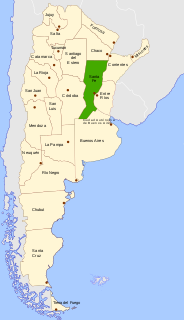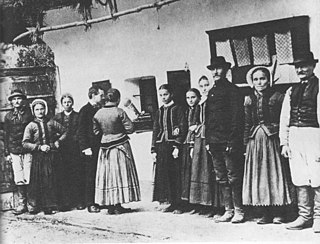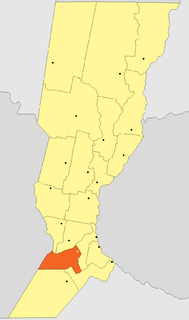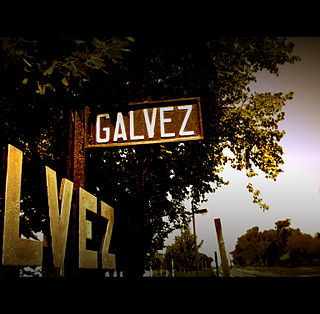| Arequito | |
|---|---|
| Town | |
| Coordinates: 33°9′S61°28′W / 33.150°S 61.467°W Coordinates: 33°9′S61°28′W / 33.150°S 61.467°W | |
| Country | Argentina |
| Province | Santa Fe |
| Department | Caseros |
| Government | |
| • Mayor | Jorge Álvarez (Socialist Party) |
| Area | |
| • Total | 503 km2 (194 sq mi) |
| Population | |
| • Total | 6,934 |
| • Density | 14/km2 (36/sq mi) |
| Time zone | ART (UTC-3) |
| CPA base | S2183 |
| Dialing code | +54 3464 |
Arequito is a town (comuna) in the south of the province of Santa Fe, Argentina, 248 km (154 mi) southwest from the provincial capital and 90 km (56 mi) west of Rosario. It has a population of about 7,000 inhabitants as per the 2001 census [INDEC].

Argentina is subdivided into twenty-three provinces and one autonomous city, Buenos Aires, which is the federal capital of the nation as decided by Congress. The provinces and the capital have their own constitutions, but exist under a federal system.

The Province of Santa Fe is a province of Argentina, located in the center-east of the country. Neighboring provinces are from the north clockwise Chaco, Corrientes, Entre Ríos, Buenos Aires, Córdoba, and Santiago del Estero. Together with Córdoba and Entre Ríos, the province is part of the economico-political association known as the Center Region.

Santa Fe de la Vera Cruz is the capital city of the province of Santa Fe, Argentina. It is situated in north-eastern Argentina, near the junction of the Paraná and Salado rivers. It lies 15 kilometres (9.3 mi) from the Hernandarias Subfluvial Tunnel that connects it to the city of Paraná. The city is also connected by canal with the port of Colastiné on the Paraná River. Santa Fe de la Vera Cruz has about 391,164 inhabitants as per the 2010 census [INDEC]. The metropolitan area has a population of 653,073, making it the eighth largest in Argentina. The third largest city in Argentina is Rosario, also located in Santa Fe Province. Rosario has a population of 1.24 million and it is the largest city in Argentina not to be a provincial capital.
The town was founded initially as a waystop (posta) by Braulio Areco in 1778. He ended up using a diminutive of his surname because there were already two postas de Areco in Buenos Aires (Carmen de Areco and San Antonio de Areco). It became a colonist settlement, and in time it was recognized officially as a town, on 1 June 1891. The area received an important influx of immigration (mostly from Europe, and also Syrian-Lebanese) during the second half of the 19th century, and became a highly productive agricultural area. Since 1970 it produces soybean (the town is the seat of the National Festival dedicated to this crop, held every October).
A diminutive is a word that has been modified to convey a slighter degree of its root meaning, to convey the smallness of the object or quality named, or to convey a sense of intimacy or endearment. A diminutive form is a word-formation device used to express such meanings; in many languages, such forms can be translated as "little" and diminutives can also be formed as multi-word constructions such as "Tiny Tim". Diminutives are often employed as nicknames and pet names, when speaking to small children, and when expressing extreme tenderness and intimacy to an adult. The opposite of the diminutive form is the augmentative. Beyond the diminutive form of a single word, a diminutive can be a multi-word name, such as "Tiny Tim" or "Little Dorrit".

Carmen de Areco is a town in Buenos Aires Province, Argentina. It is the administrative centre for Carmen de Areco Partido.

San Antonio de Areco is a city in northern Buenos Aires Province, Argentina, and administrative seat of the partido of San Antonio de Areco. It is located on the Areco River 113 km (70 mi) away from Buenos Aires city, the country's capital.
Arequito became nationally known in the 1990s as the hometown of the young folk singer and composer Soledad Pastorutti.

Folk music includes traditional folk music and the genre that evolved from it during the 20th-century folk revival. Some types of folk music may be called world music. Traditional folk music has been defined in several ways: as music transmitted orally, music with unknown composers, or music performed by custom over a long period of time. It has been contrasted with commercial and classical styles. The term originated in the 19th century, but folk music extends beyond that.

Soledad "La Sole" Pastorutti is an Argentine folk singer, who brought the genre to the younger generations at the end of the 20th century, and the beginning of the 21st.






